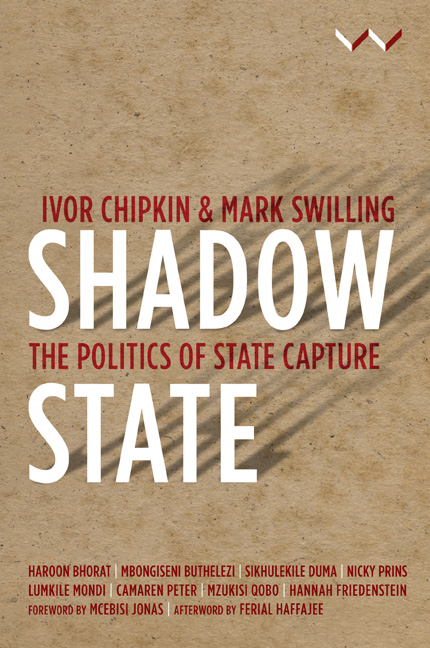Book contents
- Frontmatter
- Contents
- List of figures and tables
- Acronyms and abbreviations
- Key terms
- Acknowledgements
- Foreword
- Prologue
- Introduction
- Chapter 1 Structuring the Capture of the State
- Chapter 2 The Politics of Betrayal
- Chapter 3 Power, Authority and Audacity: How the Shadow State Was Built
- Chapter 4 Repurposing Governance
- Chapter 5 Conclusion
- Afterword
- Contributors
- Index
Prologue
Published online by Cambridge University Press: 17 May 2019
- Frontmatter
- Contents
- List of figures and tables
- Acronyms and abbreviations
- Key terms
- Acknowledgements
- Foreword
- Prologue
- Introduction
- Chapter 1 Structuring the Capture of the State
- Chapter 2 The Politics of Betrayal
- Chapter 3 Power, Authority and Audacity: How the Shadow State Was Built
- Chapter 4 Repurposing Governance
- Chapter 5 Conclusion
- Afterword
- Contributors
- Index
Summary
In mid-March 2017 Mark Swilling was travelling in business class to Johannesburg from Cape Town. He was in an aisle seat and Mcebisi Jonas, then the deputy minister of finance, was in the aisle seat on the opposite side. They had last worked together in the early 1990s when Jonas was active in the Eastern Cape, coordinating a forum focused on appropriate economic development strategies for that province.
After exchanging the usual ‘comradely’ greetings, Jonas gave Mark his iPad and said, ‘Read this and tell me what you think.’ He had already by then refused a R600 million bribe offered to him by the Gupta brothers, a move, knowing him, that came as no surprise to Mark. Mark then read a paper that in subsequent months would be read again and again by the research team – the first comprehensive overview of what all South Africans would soon come to call ‘state capture’. This was the paper that Mark gave to Ivor Chipkin at their first meeting to discuss the assembly of a team that would eventually produce the Betrayal of the Promise report. Needless to say, it was a paper that needed to be kept totally confidential.
Those who read this paper in those dark days of 2017 were all profoundly disturbed by it, and particularly frightened by the fact that it was written by a member of the Cabinet. Jonas candidly shared with Mark his deep pessimism about what was going on. He took down Mark's phone number, promising to call him. A few days later Mark got a call from Jonas asking to meet at the Sustainability Institute at Stellenbosch University.
Jonas arrived and the first thing Mark noticed was that he gave his phone to the driver before entering the building. The two hours that followed were among the most remarkable and surprising Mark had experienced since 1994. Jonas spoke about what he thought was going on. Mark desperately wanted to tape what he was saying, or take notes, but he had no idea why Jonas was there and what he needed done. Mark just absorbed what he could, describing the experience to Ivor a few days later as the sum of all fears.
When Jonas finished briefing him, Mark asked why he had come to see him. Jonas wanted to know what the academics were doing about the situation.
- Type
- Chapter
- Information
- Shadow StateThe Politics of State Capture, pp. xxi - xxviPublisher: Wits University PressPrint publication year: 2018

